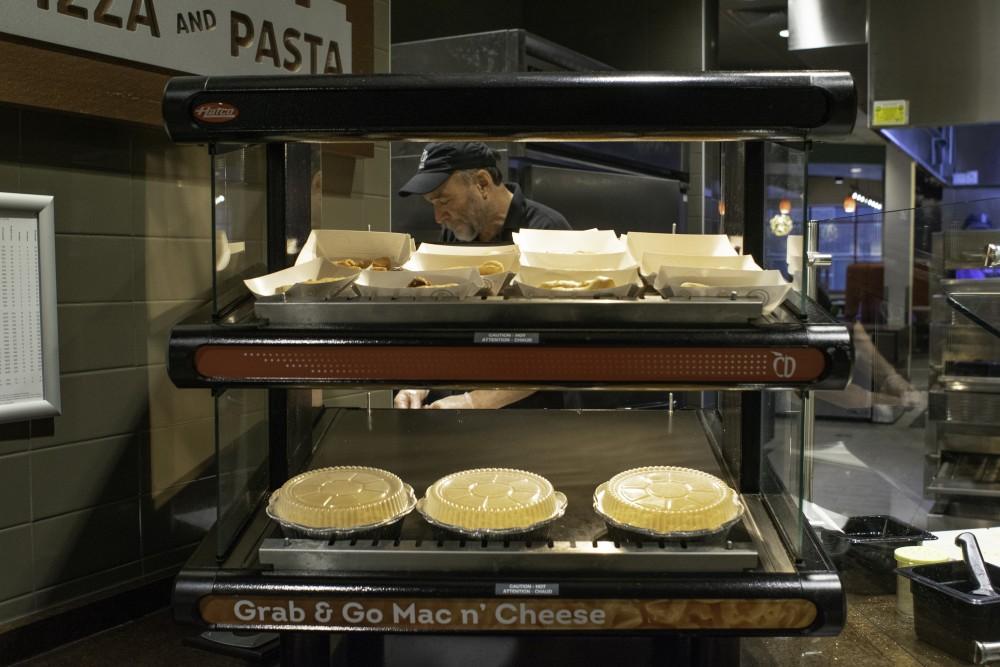Student senate resolution puts meal plan reform in spotlight

Staff prepares food at Kleiner Commons. GVL / Andrew Nyhof
Feb 18, 2019
For many students living on campus, meal plans represent their access to breakfast, lunch and dinner. While there is a variety of different plans, members of Grand Valley State University’s student senate views the costs of these plans as a barrier for some students and seek to address the issue, entertaining the idea of an income-based meal plan for future semesters.
Student senator Darwin Harris, a proponent of the income-based meal plan, states that the idea stemmed from past encounters with Replenish, the campus food pantry that services students suffering from food insecurity. He cited a lack of resources and funding as a limiting factor for the food pantry, as it relies on donations and other charitable events in order to remain operational.
“Sharalle Arnold – who is the Associate Director of the Center of Women and Gender Equity – does Replenish,” Harris said. “She talked about how Replenish cannot continue to provide for many students because the number of students needing assistance is high and their resources will eventually run out.”
Associate Director of Financial Aid and Scholarships Francesca Golden says that while on-campus meal plans can be a financial burden, the university provides resources for students, such as budgeting assistance and financial aid.
“We understand that costs are unique and individual and student situations vary, so we highly encourage students to visit our office to discuss their specific options,” Golden said. “The Office of Financial Aid and Scholarships has our financial literacy program, MoneySmart Lakers, available to help students’ budgets. We have a variety of different financial aid options available for students that identify themselves to our office as having a food insecurity.”
The current meal plan system for the Fall 2018/Winter 2019 semesters include a 7+ plan which includes seven meals per week, a 14+ plan which includes 14 meals per week and an unlimited plan that offers unlimited meals every week.
In terms of price, the middle 14+ plan costs $1,575 per semester and only accounts for two meals per day. Although the unlimited plan only costs $100 more than the 14+ meal plan per semester, Harris said these costs are limiting student access to a recommended three meals per day.
“This is my senior year, and this has been a conversation for the last few years,” Harris said. “Something that came to mind was last year they had a 19+ meal plan, but then they took it away and replaced it with the 10+ meal plan, 14+ meal plan and unlimited hot meals. I’m an RA and I get 14+, but I didn’t have the money to upgrade to the unlimited plan.”
Harris states that the students most affected by these costs are likely those who come from low-income backgrounds that may have limited resources in affording current plans. Harris’ proposal would give additional aid to students who are already eligible for Pell Grants through the U.S. Department of Education.
“I don’t know that it’d be exactly difficult,” Harris said. “Basically, we designated it for Pell-eligible students, which fall under the umbrella of either first generation students, low-income, students of color, women who have children (and) folks like that.”
Associate Vice Provost for Student Services and Director of Housing and Health Services Andy Beachnau states that implementing such a system would face certain challenges due to campus dining and housing being optional for incoming students. Despite this, the prospect of more affordable meal plans does align with the university’s mission.
“Since housing and dining are not required, the model would be challenging to implement given the range of student needs and the complexity of their individual circumstances,” Beachnau said. “Dining options that are affordable and accessible to all students regardless of income is consistent with the university’s mission and values, however.”
Harris sees the role of student senate as a means of guiding discussion toward this issue. He states that university administration has reached out to a number of students who would benefit from the plan and hopes that additional efforts are made in the future.
“We’re not the food committee, we’re not Campus Dining, we’re not financial aid,” Harris said. “We’re just bringing this forth, saying this is something that should be on our radar, this is something you all should be working on.”
During their most recent meeting on Thursday, Feb. 14 student senate passed Harris’ resolution following discussion on budgeting, implementation and university values. Next steps include working with Campus Dining and the Center for Women and Gender Equity on a feasible plan.






















